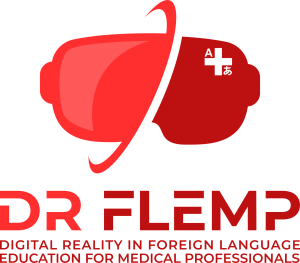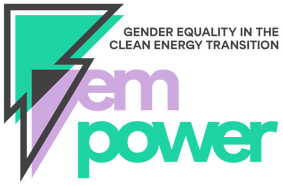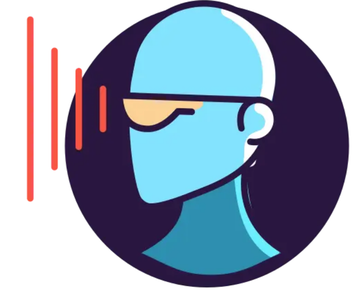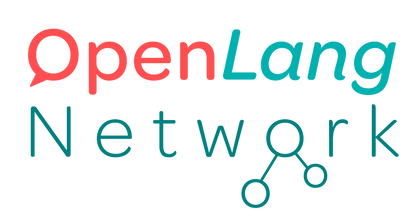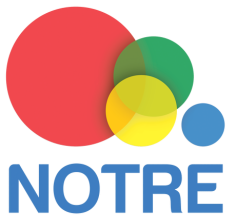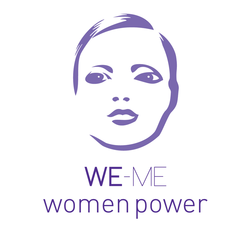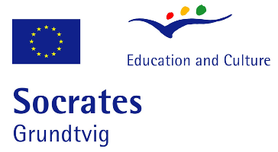Research projects
|
Children as Creators of Augmented Reality Stories (CARS) is an Erasmus+ project which aims to promote augmented reality (AR) as a medium children can use to create and share their own stories as part of their language learning experience.
Our mission is to unlock the creative potential of children by integrating augmented reality into language education, fostering a global community of young storytellers. CARS emphasises immersive language education for young learners, harnessing the captivating power of augmented reality. By engaging a vibrant network of primary schools, our partners will explore and evaluate the effectiveness of AR as a storytelling and pedagogical tool. Comprehensive training activities for teachers will be a cornerstone of the project, equipping them to guide children in becoming the narrators of their own stories. Read more here. |
|
Augmented Reality Instructional Design for Language Learning – ARIDLL project builds a partnership and a professional community to address the need for digital innovation in foreign language learning. Our objectives are to enable effective language teaching with Augmented Reality, to build capacity among language teachers to become proficient users and creators of augmented reality educational materials, and to improve the quality of language education overall.
The partners of ARIDLL consist of outstanding junior and established senior researchers and practitioners from a range of disciplinary backgrounds, university language centres, research centres working with R&D of new technologies in education, and teachers in both HE and a school. All partners have expertise in either using or designing digital technologies, including AR, for language learning and teaching. Read more here. |
|
The DR FLEMP project [Erasmus + KA2] aims to support digital transformation in Foreign Language Education (FLE) in the EU, whilst focusing on filling the existing gaps and raising efficacy of foreign language education by nursing and caretaking students, as well as already qualified professionals, through Immersive learning environments that can address the challenges of digitization in educational systems. The coordinator of the project is the Internationale Akademie für Management und Technologie (INTAMT) e.V., Germany. CUT is one of the partners of the project along with SPRACHiNVEST GmbH (Germany), Utenos kolegija (Lithuania), UMEA UNIVERSITET (Sweden), and Internationale Agentur für Marketing und Technologietransfer (INTAMT), GmbH (Germany).
Read more. |
|
The objectives of the FemPower project is to develop tools, methodologies, Open Educational Resources, a peer Learning Network and a cross-sectoral multidisciplinary collaboration that will increase inclusion and diversity in the Clean Energy Transition (CET), develop STEM/STEAM in higher education, in particular women participation in STEM and promote interest and excellence in science, technology, engineering, and mathematics (STEM) and the STEAM approach. The project coordinator is Aristotelio Panepistimio Thessalonikis, Greece (AUTH) and the partners are Politecnico Di Milano, Italy (Polimi), Technologiko Panepistimio Kyprou, Cyprus, the Centre For Research On Women’s Issues, Greece (Diotima), Centar Za Promociju Nauke Serbia (CPN), Digijeunes France Toulouse, Universidad Del Pais Vasco Spain País Vasco Leioa (UPV/EHU), Technische Universiteit Delft Netherlands Zuid-Holland (TUDELFT) and Duneworks Netherlands Noord-Brabant.
Read more. |
|
Doctoral Education for Technology-Enhanced Learning (DE-TEL) project will establish and deepen a strategic partnership for doctoral education in Technology-Enhanced Learning (TEL). DE-TEL brings together 9 internationally renowned universities and the European Association of Technology-Enhanced Learning to reflect their expertise in doctoral education into a new internationally validated program in TEL, extended with rich and professionally produced Open Educational Resources. The project grounds the design of the new program in the best practices in TEL doctoral education across Europe as well as institutional and national requirements.
Read more |
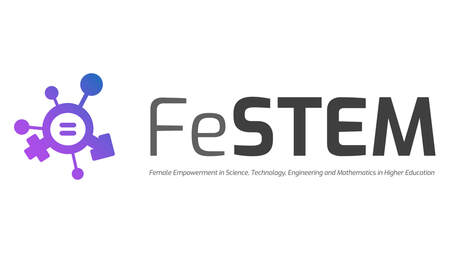
Female Empowerment in Science, Technology, Engineering and Mathematics in Higher Education (FeSTEM) aims to promote an innovative method and pedagogy that will allow HE students to use traditional and computationally-rich media to create meaningful, shareable exhibits that will act as mentoring models for encouraging girls and women to remain active in STEM.
Read more
Read more
|
CA19102 - Language In The Human-Machine Era (http://lithme.eu/) COST action supported by the EU Framework Programme Horizon 2020 Summary: LITHME has two aims: to prepare linguistics and its subdisciplines for what is coming; and to facilitate longer term dialogue between linguists and technology developers. Read more |
|
This project aims specifically at developing ‘The OPENLang Network’, which envisages to connect all the Erasmus+ KA1 Mobility Participants (HE students and staff, VET (at least 1 month mobility), Adult and School education staff, Youth learners, Youth Workers, Youth Entrepreneurs) in an OPEN informal and highly interactive online environment which could support more efficiently their effort to develop their language skills of the target mobility EU languages. In parallel, it will support their cultural understanding and integration in the host EU country as well their success in their specific subject field of study and/or work.
Read more |
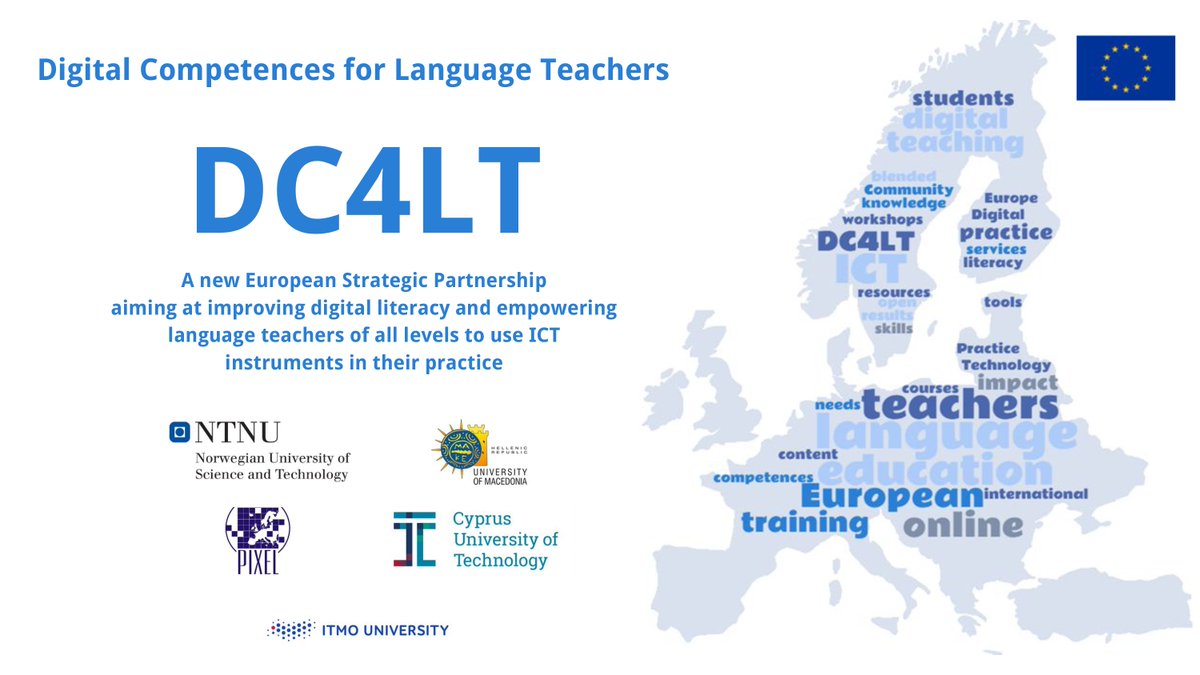
|
DC4LT - Digital Competences for Language Teachers (2018-2021) is funded by the European Commission in the framework of the Erasmus+ Programme, KA2 - Strategic Partnership in the field of Higher Education. The DC4LT project aims at empowering EU Language Teachers with Digital Competences in order to strengthen them with open and innovative tools and methodologies, and be able to teach online and mobile to a worldwide audience. The project is a transnational partnership between the Norwegian University of Science and Technology - NTNU (Norway, coordinator), the Cyprus University of Technology (Cyprus), the University of Macedonia (Greece), and ITMO University (Russia).
Read more |

|
Structuring Discourse in Multilingual Europe (TextLink): The TextLink Action will facilitate European multilingualism by a) identifying and creating a portal into such resources within Europe including annotation tools, search tools, and discourse-annotated corpora; b) delineating the dimensions and properties of discourse annotation across corpora; c) organising these properties into a sharable taxonomy; d) encouraging the use of this taxonomy in subsequent discourse annotation and in cross-lingual search and studies of devices that relate and structure discourse; and e) promoting use of the portal, its resources and sharable taxonomy.
Read more |
|
NOTRE project aims to develop a network that will strengthen and enhance the research and innovation potential and capability of the newly established Social Computing Research Centre (SCRC) at the Cyprus University of Technology (CUT) for stimulating scientific excellence and innovation capacity in the area of Social Computing.
The NOTRE project is funded by Horizon 2020 Twinning programme – TWINN – 2015 and the duration of the project is 36 months (01/01/2016-31/12/2018). Read more |
|
WoMEnpower (WE-ME) - Research project supported by Mahallae digital neighbourhood under the aegis of UNDP and USAID
Summary: WoMEnpower (WE-ME) is a community platform that aims to link women mentors and mentees together. More specifically WE-ME is developed for helping young women receive support and advice in regards to self-improvement, aiming to increase their self-esteem, personal and social power, and solidarity. WE-ME aims at encouraging dialogue and mentoring between women both online and offline. Read more |
|
LUCIDE project- Languages in Urban Communities - Integration and Diversity for Europe
Research project supported by European Commission under the KA2 scheme. Summary: LUCIDE is a network which is developing ideas about how to manage multilingual citizen communities by building up a picture of how communication occurs in multilingual settings across the EU and beyond. The aim is to help institutions (councils, schools, hospitals) and local and national economies make better productive use of diversity as an economic resource and to strengthen social cohesion by fostering better communication and mutual understanding. Read more |
|
|
Creativity: New technologies in Intercultural/ Multilingual Education (08/2009 – 07/2011)
Project supported by European Commission under Grundtvig scheme. Summary: Fundamental activities of this project are to provide key expertise of creativity, linguistic and intercultural learning through computer science for young people, for adults and for emigrants, organize intercultural activities to support a better social and cultural integration. Orient to formative way choices and spread a bigger use of the informational systems, formative systems and support centres for the disadvantaged classes. Read more |


